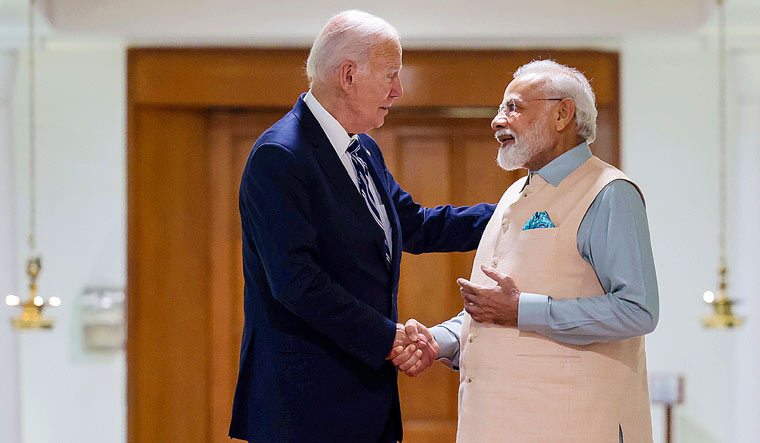China cast its long overriding shadow in the bilateral talks between Prime Minister Narendra Modi and US President Joe Biden in New Delhi when they met on the eve of the G20 Leaders’ Summit on Friday night.
A White House release on the bilateral meeting was predictable. From Quad to Predator drones to General Electric’s F 414 engines to power India’s future fighter aircraft fleet, it had it all.
Just after the introductory perfunctory, the joint statement brought up the Quad—the grouping comprising the US, China, Australia and Japan that many view as an anti-China grouping.
The fourth para in the 29 para release said: “Prime Minister Modi and President Biden reaffirmed the importance of the Quad in supporting a free, open, inclusive, and resilient Indo-Pacific.”
The next meeting of the Quad Leaders’ Summit will be hosted by India in 2024. “India welcomed the US decision to co-lead the Indo-Pacific Oceans Initiative Pillar on Trade Connectivity and Maritime Transport, further to the US decision to join IPOI in June 2023,” it added.
Welcoming the August 29 US Congressional notification and the ongoing negotiations for the agreement on the GE F-414 jet engines, the two leaders reaffirmed the commitment for collaboration to support the advancement of this “unprecedented co-production and technology transfer proposal”.
The US has never transferred technology of the aircraft engines to the level that is being offered to India.
Similarly, there were polite words for the Indian proposal to buy 31 General Atomics MQ-9B (16 Sky Guardian and 15 Sea Guardian) remotely piloted aircraft and their associated equipment.
As expected, President Biden reiterated support for India’s permanent membership in the UN Security Council. This assumes significance in the backdrop of strong signals by the UN Secretary General António Guterres in his press conference in New Delhi on Friday of his eagerness to include India in an expanded Security Council.
Notably, Stephane Dujarric, spokesperson for the UN Secretary-General, said on Thursday in Jakarta that Gutterres has been a “strong advocate” for India's inclusion in the permanent seat for the UN Security Council.
Dujarric was speaking on the sidelines of the ASEAN-India Summit and East Asia Summit in Jakarta, which was also attended by Modi.
The US also reaffirmed its support for India’s membership in the Nuclear Suppliers Group.
On the India-US Initiative on Critical and Emerging Technology (iCET), the two leaders declared their intention “to undertake a midterm review of iCET in September 2023 to continue to drive momentum toward the next annual iCET review, co-led by the National Security Advisors of both countries, in early 2024.”
The two nations also sought to deepen the partnership in outer space exploration with ISRO and the NASA having commenced discussions on modalities, capacity building, and training for mounting a joint effort to the International Space Station in 2024 besides continuing efforts to finalise a strategic framework for human space flight cooperation by the end of 2023.
The two leaders also declared the intention “to increase coordination on planetary defence to protect planet Earth and space assets from the impact of asteroids and near-Earth objects”.



